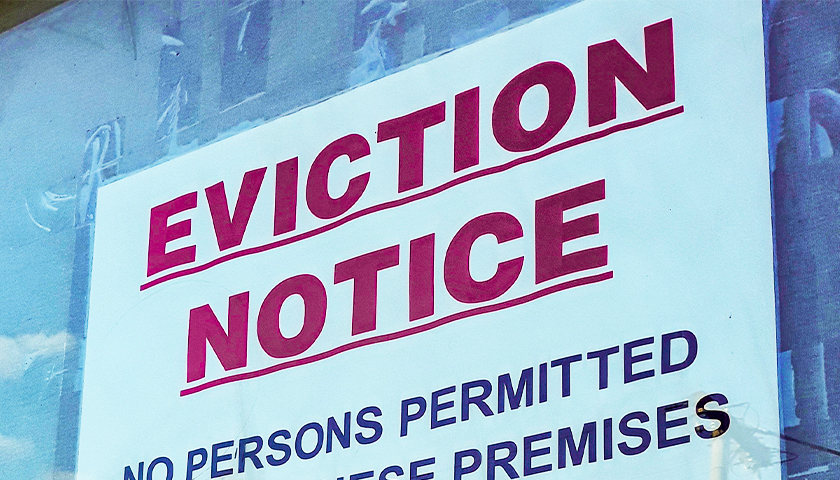by Kimberly Hermann
One night while we were sleeping, America lost its Constitution.
That’s not such an unrealistic scenario, and it can happen without gunfire or marches in the streets. In fact, with very little drama, it may be occurring at this moment. By itself, the U.S. Constitution is merely a collection of words. Only citizens who cherish liberty give the document real meaning, and if they remain silent when it’s under threat – as it surely is at this hour – our rights and freedoms become imperiled.
A dispute over housing evictions, as unlikely and as mundane as that may sound, is at the epicenter of the crisis. But here we are. It began in March 2020 when Congress passed a moratorium on evictions that was restricted to federally subsidized housing. The intent was to limit evictions and homelessness to keep people indoors and thus slow the transmission of COVID-19.
Congress set the mandate to expire in July 2020. But on September 4, 2020, the Centers for Disease Control and Prevention extended the ban to the end of the year and expanded it to include almost all tenants earning less than $99,000 annually or couples making $198,000. And that’s when the trouble started. The CDC, an executive agency under the control of the White House, had acted independently of constitutional and congressional authority.
That’s a big deal because, as we learned in high school civics, the executive, legislative and judicial branches of government act as a system of checks and balances in order to prevent any one branch from becoming too powerful.
The CDC again extended the order through March 31, June 30, and July 31, 2021. This serial usurpation of congressional power led to several court challenges against the agency’s moratorium. A restrained Supreme Court voted on June 29 to leave the CDC ban in place until its expiration date, but in his concurrence, Justice Kavanaugh wrote, “In my view, clear and specific congressional authorization (via new legislation) would be necessary for the CDC to extend the moratorium past July 31.” And in any case, the agency declared, that “CDC does not expect to extend the Order further.”
The unconstitutionality of these actions were affirmed months before when Judge Campbell Barker in the Eastern District of Texas held the CDC’s ban was unconstitutional in Terkel v. CDC. In his opinion, Judge Barker explained that “the federal government’s Article I power to regulate interstate commerce and enact laws necessary and proper to that end does not include the power to impose the challenged eviction moratorium.” In other words, neither the CDC nor Congress has the authority to control state eviction proceedings.
Over the following months, more courts weighed in and found the CDC’s ban unlawful. Most recently, in Tiger Lily, LLC v. HUD, the U.S. Court of Appeals for the Sixth Circuit unanimously found that the CDC’s ban was unlawful. In his opinion, Judge John K. Bush explained that allowing the CDC to usurp powers not delegated by Congress, “would grant the CDC director near-dictatorial power for the duration of the pandemic, with authority to shut down entire industries as freely as she could ban evictions.”
On August 3, President Biden seemed to dismiss the idea of another extension, saying, “The bulk of the constitutional scholarship says that it’s not likely to pass constitutional muster.” But then the president, who took an oath on January 1 to “preserve, protect and defend the Constitution of the United States,” shamelessly signaled that he would defy the law for transient political purposes. “But, at a minimum, by the time it gets litigated,” he said, “it will probably give some additional time” to distribute $46 billion the federal bureaucracy had long fumbled in getting into the hands of renters. And just hours later, the CDC issuedits fifth eviction moratorium, this one extending through October.
Yes, the endless moratoria have caused serious problems in the here and now. Landlords have been given no reprieve from their mortgages, taxes and obligations to maintain their properties. Many small operators find themselves struggling to avoid bankruptcy. Eventually, however, matters between tenants and landlords will be resolved and economic stability will return – even if things get worse before they get better.
But America faces a crisis that transcends the present. Unless the courts, Congress, and the American voters act today to hold this administration accountable for violating the Constitution, future generations will be ruled over by White House occupants no longer bound by an inspired framework that has protected our rights as citizens for 234 years. When there is no longer a separation of powers, Congress becomes a rubber stamp at best and the voice of the people no longer matters. If we fail to answer this call, if we do nothing because we’re preoccupied with our daily routines, then this could mark the end of America’s experiment with representative democracy.
– – –
Kimberly Hermann is a contributor to RealClearMarkets.
Photo “Eviction Notice” by David Jackmanson (CC BY 2.0).






How to radicalize poor people in one easy lesson? Have them evicted; and have them RESIST eviction by any means necessary! Remember the Depression ninety years ago? Several tenants and former home-owners decided to “squat” and to go after bankers and remote slum-lords and slum-ladies. Get ready for a repeat.
What took the SCOTUS so long? It was a blatant unconstitutional action.
Last night (8-26-21), the Supreme Court ended the CDC’s unconstitutional eviction moratorium that was set to expire October 3 in a challenge brought by landlords and real estate groups.
The Supreme Court ruled 6-3 along ideological lines that the CDC’s moratorium needs congressional authorization in order to continue.